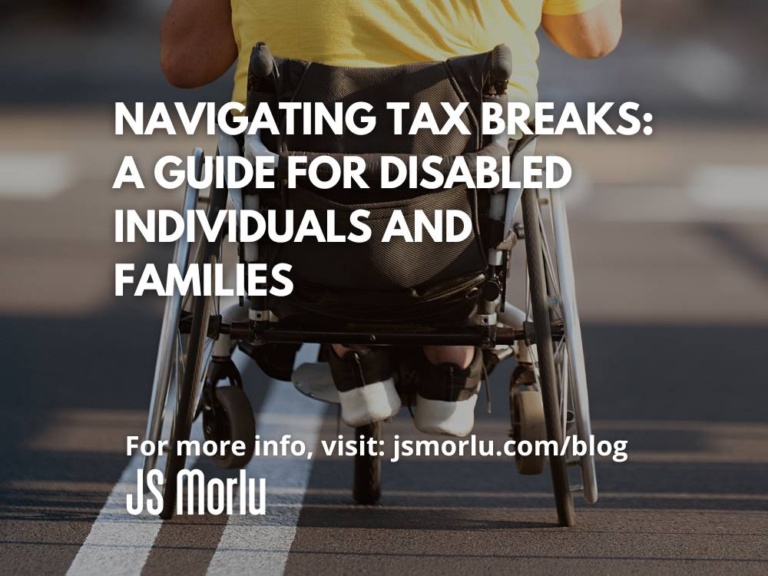Did you know that there are several tax credits and other tax benefits available to disabled individuals and their families? If you or someone you know has a disability, you may be eligible to save money on your taxes. This article will discuss some of the most common tax benefits for disabled taxpayers and their dependents.
Increased Standard Deduction
Taxpayers who are legally blind are eligible for an increased standard deduction. For 2024, a blind taxpayer filing jointly with a spouse can add an additional $1,550 to the standard deduction. If both spouses are blind, the add-on doubles to $3,100. There is also an “elderly” add-on to the standard deduction for taxpayers age 65 or older. These add-ons are only available to the taxpayer and spouse, not to dependents.
Exclusions from Gross Income
Certain disability-related payments, such as Veterans Administration disability benefits and Supplemental Security Income, are not considered taxable income. However, up to 85% of Social Security disability benefits may be taxable, depending on the amount of the recipient’s other income.
Impairment-Related Work Expenses
Individuals with a disability may be able to deduct impairment-related work expenses. These expenses can include the cost of attendant care services, as well as other expenses necessary for the individual to be able to work. For example, a blind taxpayer may be able to deduct the cost of having someone read work-related documents to them.
Filing for a Tax Refund if Financially Disabled
Under normal circumstances, there is a three-year deadline to claim a tax refund. However, this deadline is suspended for taxpayers who are considered “financially disabled.” A taxpayer is considered financially disabled if they are unable to manage their financial affairs due to a medically determinable physical or mental impairment.
Earned Income Tax Credit (EITC)
The EITC is a tax credit that is available to low- and moderate-income taxpayers. The EITC is also available to disabled taxpayers and the parents of a child with a disability, even if the child’s age would normally prevent them from being a qualifying child. To be eligible for the credit, the taxpayer must receive earned income, such as wages or self-employment income.
Child or Dependent Care Credit
Taxpayers who pay someone to care for their disabled spouse or dependent at home may be able to claim the child or dependent care credit. This credit is typically limited to care expenses for children under age 13, but there is no age limit for disabled individuals.
Special Medical Deductions
In addition to conventional medical deductions, there are special medical deductions available for disabled taxpayers and their dependents. These deductions can include the cost of special equipment or home improvements that are necessary for medical care, the cost of tuition to a special school for a child with a disability, and the cost of maintaining a guide dog or other service animal.
Exclusion of Qualified Medicaid Waiver Payments
Payments made to care providers who care for disabled individuals in their homes may be excluded from the care provider’s income under certain circumstances.
ABLE Accounts
ABLE accounts allow individuals and families to save money for the purpose of supporting individuals with disabilities. ABLE accounts are similar to 529 plans, which are designed for saving for education expenses. The main benefit of ABLE accounts is that they allow individuals with disabilities to save money without jeopardizing their eligibility for government benefits.
Conclusion
If you have a disability or care for someone with a disability, you may be eligible for several tax benefits. These benefits can help you save money on your taxes and improve your financial security. To learn more about the tax benefits available to disabled individuals and their families, consult with a tax advisor.
JS Morlu LLC is a top-tier accounting firm based in Woodbridge, Virginia, with a team of highly experienced and qualified CPAs and business advisors. We are dedicated to providing comprehensive accounting, tax, and business advisory services to clients throughout the Washington, D.C. Metro Area and the surrounding regions. With over a decade of experience, we have cultivated a deep understanding of our clients’ needs and aspirations. We recognize that our clients seek more than just value-added accounting services; they seek a trusted partner who can guide them towards achieving their business goals and personal financial well-being.
Talk to us || What our clients says about us


